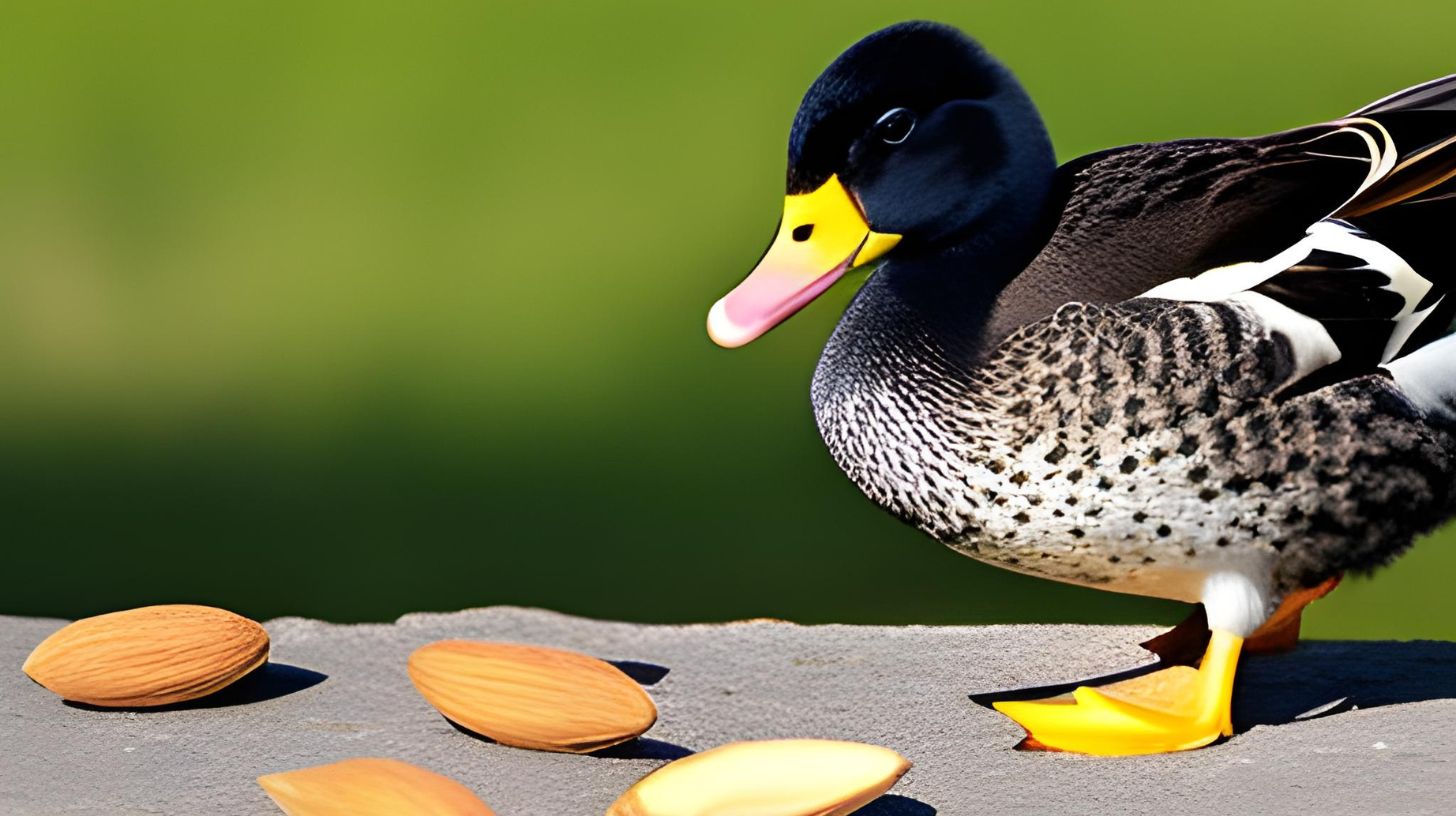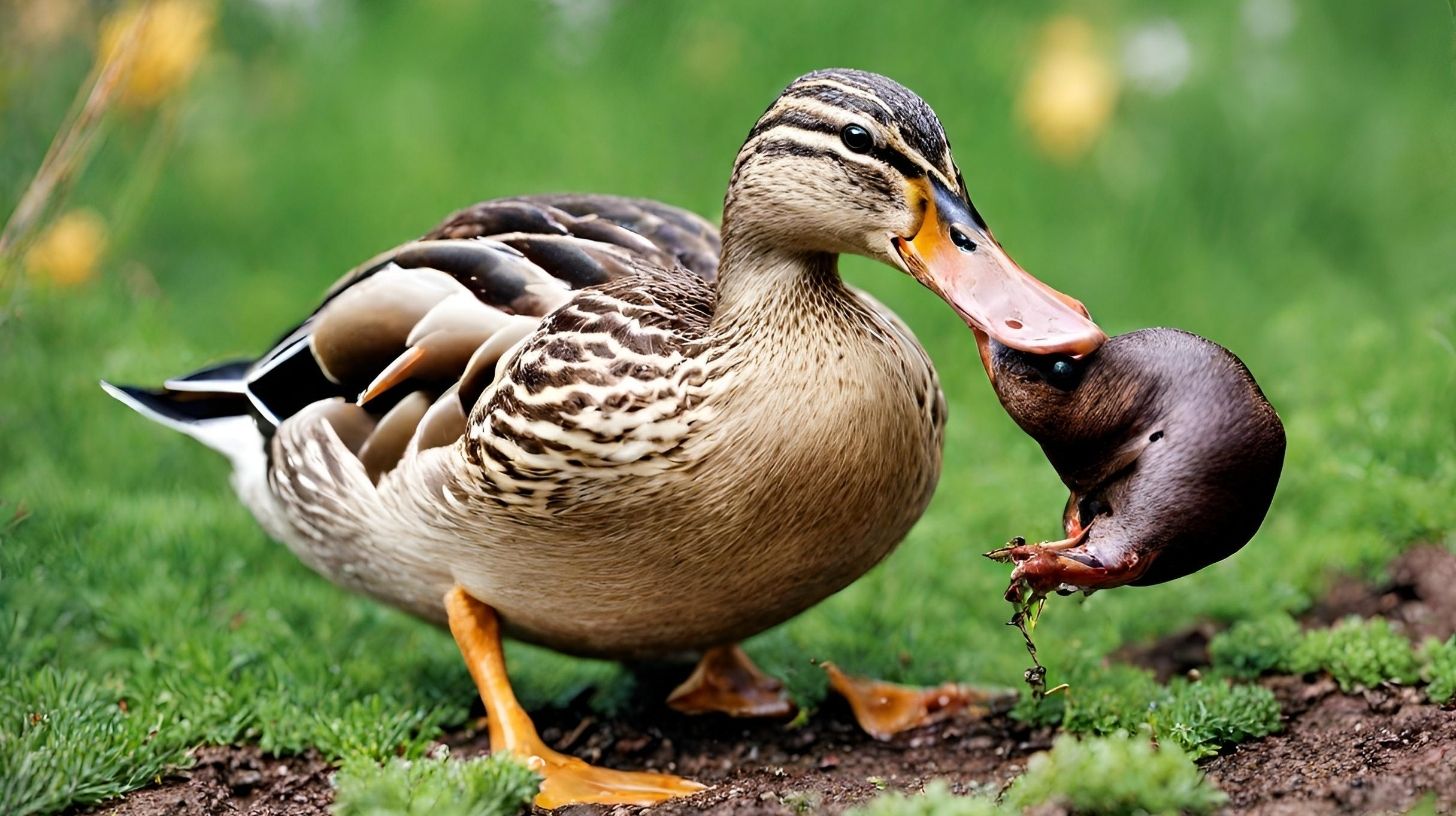Can Ducks Eat Safflower Seeds? Nutrition and Feeding Tips
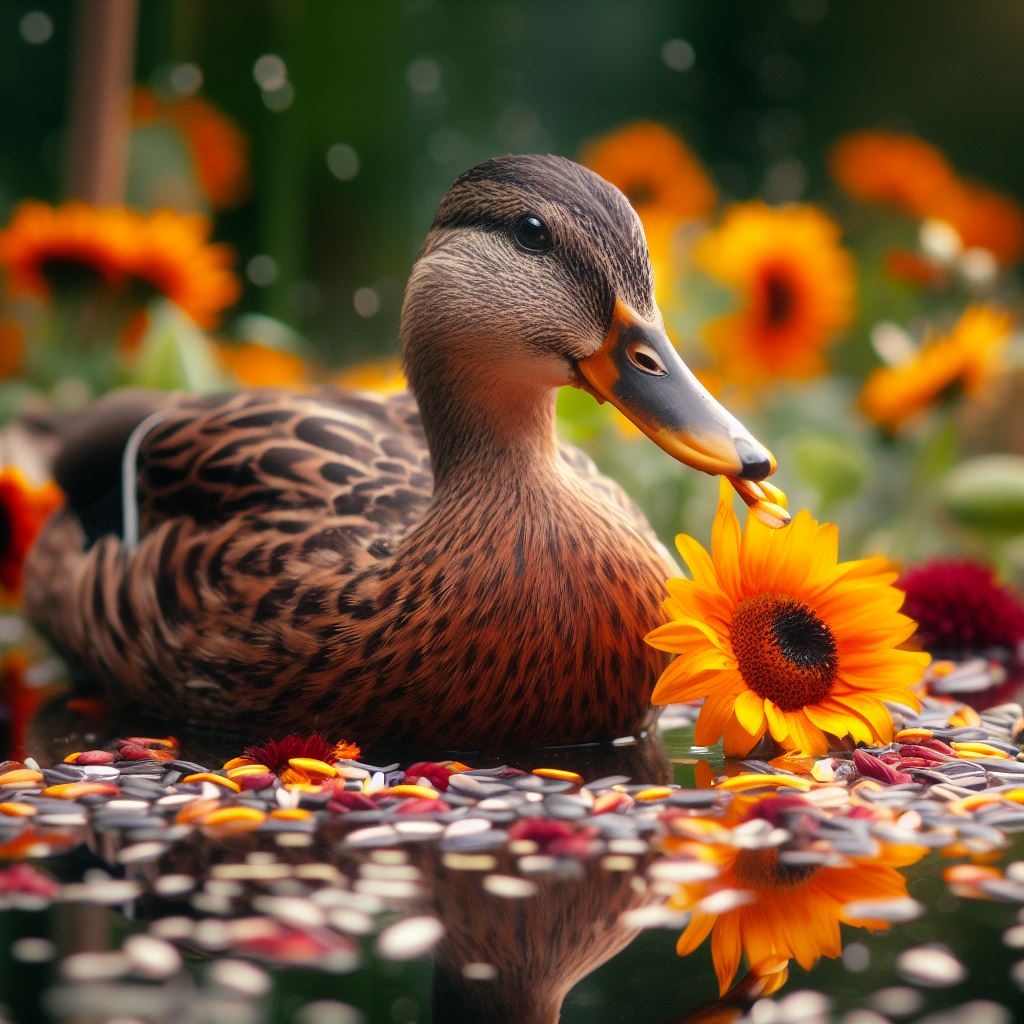
Table of content:
- Nutritional Value of Safflower for Ducks
- Benefits of Feeding Ducks Safflower Seeds
- Risks and Precautions When Feeding Ducks Safflower
- Dosage and Feeding Recommendations
- Which Types of Ducks Can Eat Safflower?
- Can Baby Ducks Eat Safflower Seeds?
- How to Soak and Sprout Safflower Seeds for Ducks
- How to Store Safflower Seeds for Ducks
- Can Ducks Eat Safflower Leaves and Flowers?
- Frequently Asked Questions
- Conclusion
Can ducks eat safflower seeds? The short answer is yes, ducks can safely eat safflower seeds in moderation as part of a balanced diet. Safflower seeds provide ducks with important nutrients like fat, protein and fiber. However, too many safflower seeds can lead to health issues, so it’s important to feed ducks a varied diet.
Key Takeaways:
- Safflower seeds are a nutritious supplement for ducks and provide fat, protein and fiber.
- Feed safflower in moderation – no more than 10% of a duck’s diet. Too much can cause digestive issues.
- Baby ducklings can eat crushed safflower seeds once they are 2-3 weeks old.
- Combine safflower with other seeds, grains and greens for a balanced duck diet.
- Soak or sprout safflower seeds to increase digestibility.
- Store safflower properly to maintain freshness. Refrigerate after opening.
Safflower is an annual flowering plant grown for its seeds, which are used to produce safflower oil. The seeds and oil have become popular supplements in bird feed due to their high fat and protein content.
For duck owners, safflower can be a great addition to a balanced diet. Let’s take a closer look at the benefits and risks of feeding safflower to ducks.
Nutritional Value of Safflower for Ducks
- Fat: Up to 40% fat content, mostly mono- and polyunsaturated fats. Important energy source.
- Protein: 15-20% protein. Provides amino acids for growth and maintenance.
- Fiber: Provides bulk for healthy digestion.
- Vitamin E: An antioxidant that supports a healthy immune system.
- Carotenoids: Antioxidants like lycopene and zeaxanthin. Promote eye, skin and immune health.
The high fat content makes safflower a great energy source for ducks. The balance of omega-3 and omega-6 fatty acids supports skin and feather health.
The fiber aids digestion, while the protein provides essential amino acids ducks need. Vitamin E and carotenoids boost the immune system and overall duck health.
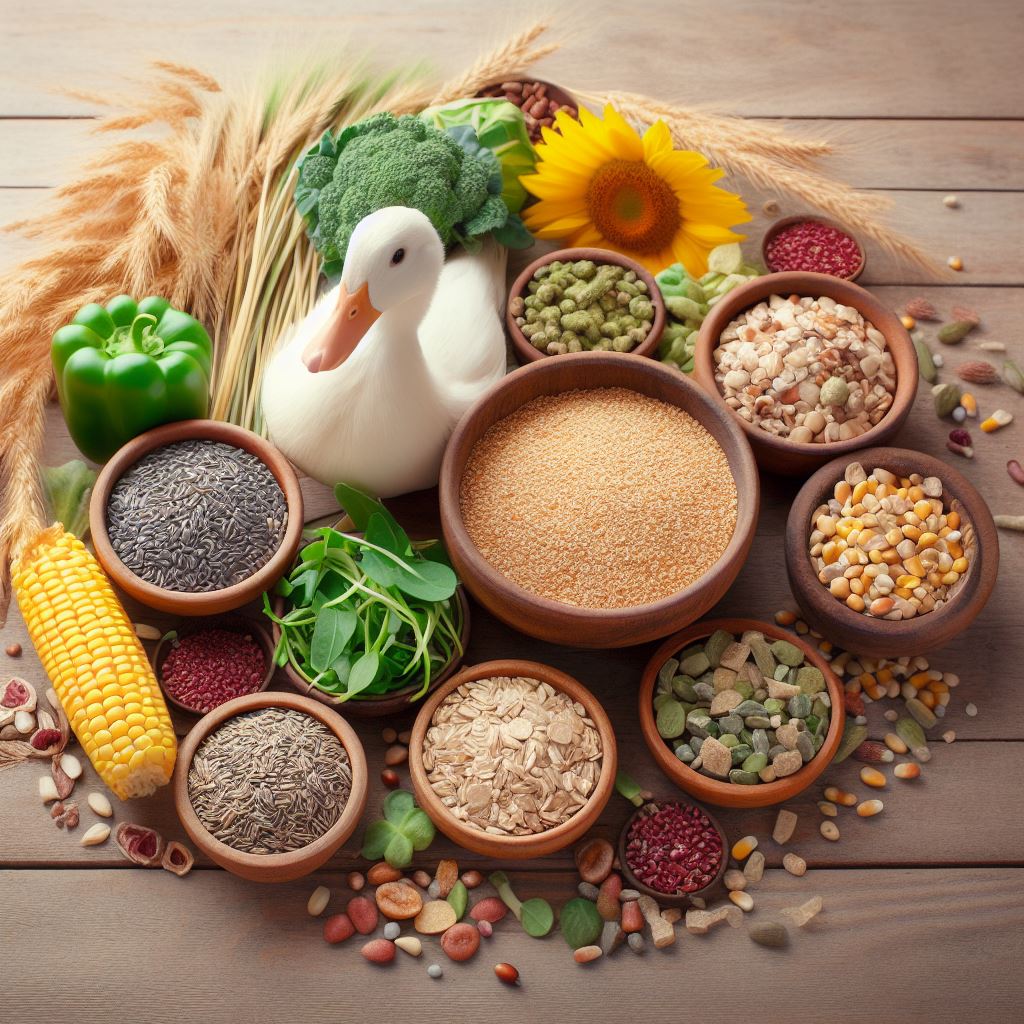 Benefits of Feeding Ducks Safflower Seeds
Benefits of Feeding Ducks Safflower Seeds
Feeding ducks safflower seeds offers several benefits:
- Highly palatable: Ducks find safflower very tasty and appealing. This encourages eating.
- Energy dense: Up to twice the fat content of corn. Provides concentrated calories.
- Low waste: Ducks tend to eat all parts of the seed, generating less waste.
- Cold hardy: Tolerates cold weather better than other seeds. Remains fresh longer.
- Long storage: Under proper storage, safflower retains freshness for up to a year.
- Added nutrition: Provides fat, protein and antioxidants lacking in commercial duck feeds.
- Promotes foraging: Scattering safflower encourages natural foraging behaviors.
- No choking risk: Whole safflower seeds have a low choking risk compared to cracked corn.
The appeal, nutrition and storage stability make safflower a sensible addition to a duck’s diet. It satisfies foraging needs and provides added health benefits.
Risks and Precautions When Feeding Ducks Safflower
While safflower offers benefits, overfeeding it can cause problems. Here are some precautions:
- Too much fat: Excessive fat from too much safflower can lead to obesity and liver damage.
- Nutritional imbalance: Safflower lacks vitamins and minerals ducks need. Don’t overfeed it.
- Digestive upset: High fiber and fat can cause loose droppings if ducks eat too much.
- Reduced appetite: Ducks may fill up on safflower and eat less of a balanced diet.
- Rancid oil: Spoiled safflower oil releases harmful free radicals. Store properly.
- Young ducklings: Avoid feeding safflower to ducklings under 2-3 weeks old. Wait until older.
To avoid issues, safflower should make up no more than 5-10% of an adult duck’s daily food intake. Feed a variety of grains, greens and protein sources too.
Dosage and Feeding Recommendations
Follow these tips for safely feeding safflower to ducks:
- Scatter feed safflower rather than offering it in a bowl. This encourages natural foraging behavior.
- Soak or sprout seeds before feeding. This increases digestibility and nutrient absorption.
- Limit safflower to 1-2 ounces (28-57g) per adult duck per day for a balanced diet.
- Avoid feeding young ducklings safflower until 2-3 weeks old. Then feed soaked, crushed seeds.
- Combine safflower with other seeds: wheat, barley, millet, oats. Ducks relish a seed mixture.
- Mix with greens: kale, Swiss chard, spinach. Combining with greens balances nutrition.
- Store safflower in an airtight, sealed container in a cool, dry place away from sunlight. Refrigerating after opening helps prevent rancidity.
Following these feeding guidelines will allow you to safely incorporate safflower into your duck’s diet and gain the benefits it offers. Monitor your duck’s droppings for any signs of digestive upset. Reduce the safflower and consult a veterinarian if needed.
Which Types of Ducks Can Eat Safflower?
All major domestic duck breeds can safely eat safflower seeds in moderation. This includes popular breeds like:
- Mallard
- Ancona
- Muscovy
- Rouen
- Cayuga
- Swedish
- Indian Runner
- Khaki Campbell
- Calls
- Crested
- Pekin
Mallard ducks are the wild ancestors of domestic ducks. As opportunistic foragers, wild mallards will readily feed on fallen safflower seeds they encounter.
Even large meat duck breeds like Muscovies and Pekins can eat safflower. The high fat content makes it a good energy source for these rapidly growing ducks.
The higher protein content of safflower also makes it suitable for egg laying breeds like Khaki Campbells and Indian Runners.
Overall, safflower makes a fine supplement for ducks of all breeds when fed properly. Adjust amounts based on the individual duck’s weight and activity level.
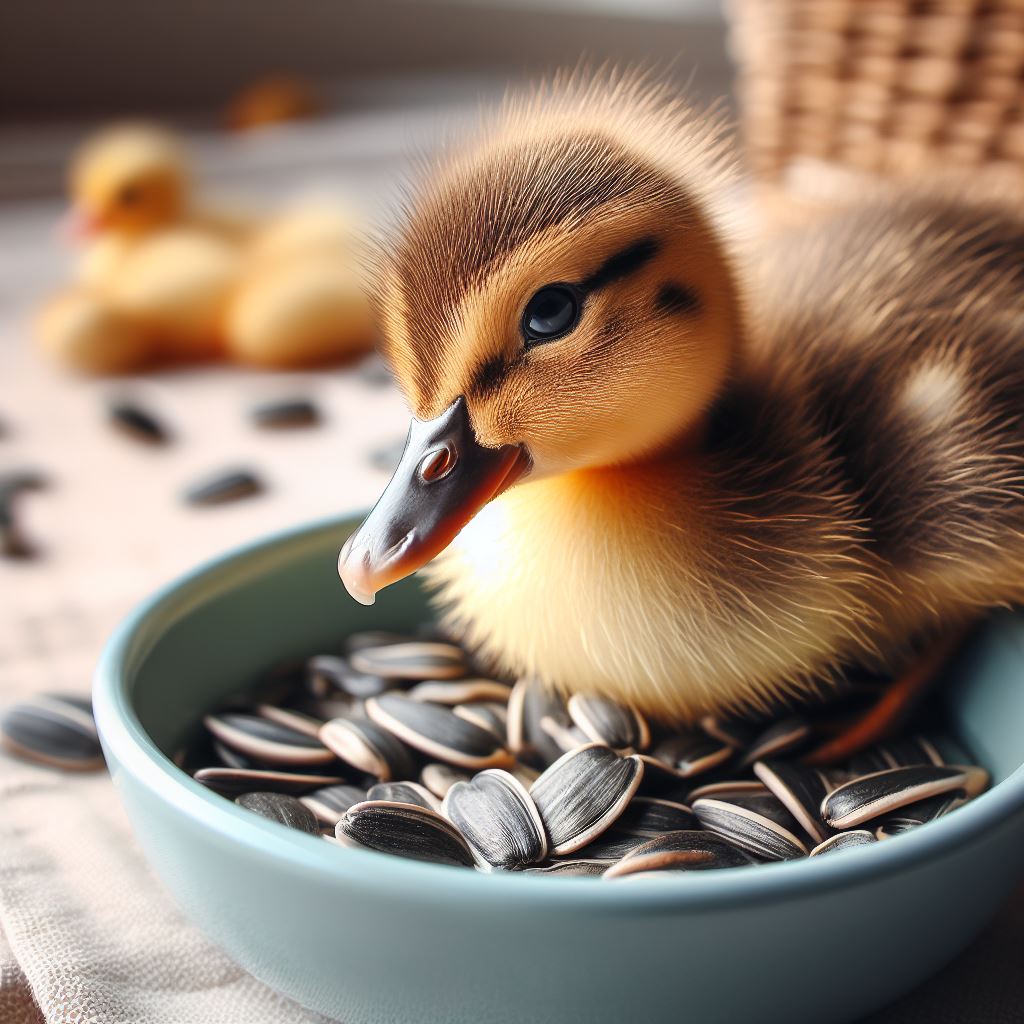 Can Baby Ducks Eat Safflower Seeds?
Can Baby Ducks Eat Safflower Seeds?
Young ducklings should not eat whole safflower seeds until they are 2-3 weeks old. Baby ducks under 2 weeks of age lack the digestive system needed to properly break down and digest whole seeds.
Trying to eat whole safflower seeds can pose a choking risk or cause intestinal blockages in young ducklings. Hard seeds may also abrasively damage the delicate tissue of the crop and gizzard.
For very young ducklings under 1 week old, feed a chick starter feed with at least 20% protein. Provide duckweed, finely crumbled hard boiled egg yolk or soaked bird seed once they reach 1-2 weeks old.
Once baby ducks pass 2-3 weeks of age, they can eat soaked, crushed safflower seeds safely. Soak the seeds for a few hours to soften them, then crush them between two spoons before feeding to young ducklings.
By the time ducks reach 4-8 weeks old, they can handle whole soaked safflower seeds and properly digest the fat, fiber and protein. Slowly increase safflower amounts as the ducklings grow.
With proper precautions, safflower seeds can provide added nutrition to help growing ducklings thrive.
How to Soak and Sprout Safflower Seeds for Ducks
Soaking or sprouting safflower seeds before feeding makes them safer and more digestible for ducks. Here’s how:
To soak:
- Place seeds in a jar and cover with 2-3 times as much cool, clean water.
- Let soak 8-12 hours to fully hydrate seeds. Drain off water.
- Rinse soaked seeds and drain again before feeding.
To sprout:
- Soak seeds 8-12 hours then drain. Transfer to a sprouting jar.
- Rinse and drain seeds 2-3 times per day. Small sprouts will form in 2-3 days.
- Rinse and feed sprouted seeds before sprouts grow beyond 1/4 inch.
Soaking makes seeds softer and easier to digest. Sprouting makes nutrients more bioavailable and increases vitamin content.
Offer soaked or sprouted safflower along with other soaked grains and bird seed. The added hydration helps ducks properly digest the mix.
How to Store Safflower Seeds for Ducks
Follow these storage tips to keep safflower seeds fresh and prevent them going rancid:
- Store in an airtight container in a cool, dry place away from sunlight. A pantry or cupboard works well.
- Refrigerating after opening helps seeds last up to a year. Freezing for 48 hours kills any insect eggs.
- Transfer to a freezer bag or freezer-safe tub if freezing larger amounts. Avoid repeated freezing and thawing.
- Check seeds periodically for moisture and insect infestations. Discard any clumped or moldy seeds.
- Use older seeds first and replenish your stock with fresh seeds every 6-8 months.
- Purchase seeds in small batches to ensure freshness, especially in hot summer months.
Proper storage keeps safflower nutritious and appealing to ducks when you go to feed it. It retains the important fats, proteins, fibers and antioxidants ducks benefit from. Following these tips will help the seeds stay fresh in the bag and in the bird!
Can Ducks Eat Safflower Leaves and Flowers?
Ducks can eat all parts of the safflower plant, including leaves, flower petals and seeds. However, most duck keepers only feed the seeds.
Safflower leaves offer nutrients like beta-carotene, vitamin C, folate and minerals. However, the leaves lack the high fat and protein content that makes safflower seeds so beneficial.
The flowers provide nectar that ducks enjoy, but minimal nutritional value. Ducks are unlikely to encounter fresh safflower foliage and flowers unless you grow the plants yourself.
While ducks can eat all safflower plant parts, the seeds offer the greatest nutritional value and convenience as a supplement. The leaves and flowers don’t provide significant nutrition to make feeding them worthwhile.
Frequently Asked Questions
Is safflower healthy for ducks?
Yes, safflower is healthy for ducks in moderation. It provides fat, protein and antioxidants. But too much safflower can cause obesity and other issues, so it should be limited.
Should you feed ducks safflower seeds?
Feeding some safflower seeds is fine as part of a varied diet. But safflower should not exceed 5-10% of total food intake for balanced nutrition.
Can too much safflower hurt ducks?
Yes, overfeeding safflower can lead to nutritional imbalances, obesity, liver damage and other problems. Limit safflower to 1-2 ounces per duck daily.
Do wild ducks eat safflower seeds?
Wild ducks like mallards will opportunistically feed on safflower seeds they find while foraging. However, it makes up a small portion of their diverse natural diet.
How long do safflower seeds last for ducks?
Stored properly in a cool, dry place, safflower seeds will remain fresh and nutritious for ducks for up to 1 year. Refrigerate after opening.
Can baby ducks eat safflower seeds?
Ducklings under 2-3 weeks old should not eat whole safflower seeds. Wait until older, then feed crushed, soaked safflower for easier digestion.
Conclusion
In conclusion, safflower seeds can be a healthy supplemental food for ducks when fed properly. The high fat, protein and antioxidants make it nutritionally valuable. Feed safflower in moderation along with a diverse diet for optimal duck health. Limit intake to 1-2 ounces per duck per day.
Soaking safflower improves digestion, while sprouting increases nutrient content. Avoid feeding safflower to ducklings under 2-3 weeks old. Wait until they mature before introducing small amounts of soaked, crushed seeds.
Storing safflower properly helps it remain fresh and prevents spoilage. An airtight container in a cool, dry, dark place is ideal, refrigerating after opening. Following these best practices allows you to safely include safflower in your duck’s feeding regimen and gain the advantages it offers.
Welcome. I’m Adreena Shanum, the proud owner of this website, and I am incredibly passionate about animals, especially poultry. I founded adreenapets.com as a labor of love, stemming from my desire to share my knowledge and experiences with poultry enthusiasts worldwide.


